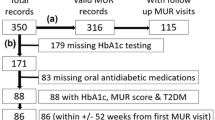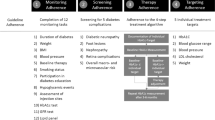Abstract
Background Adherence to medicines is important in subjects with diabetes, as nonadherence is associated with an increased risk of morbidity and mortality. However, it is not clear whether there is an association between adherence to medicines and glycaemic control, as not all studies have shown this. One of the reasons for this discrepancy may be that, although there is a standard measure of glycaemic control i.e. HbA1c, there is no standard measure of adherence to medicines. Adherence to medicines can be measured either qualitatively by Morisky or non-Morisky methods or quantitatively using the medicines possession ratio (MPR). Aims of the review The aims of this literature review are (1) to determine whether there is an association between adherence to anti-diabetes medicines and glycaemic control, and (2) whether any such association is dependent on how adherence is measured. Methods A literature search of Medline, CINAHL and the Internet (Google) was undertaken with search terms; ‘diabetes’ with ‘adherence’ (or compliance, concordance, persistence, continuation) with ‘HbA1c’ (or glycaemic control). Results Twenty-three studies were included; 10 qualitative and 12 quantitative studies, and one study using both methods. For the qualitative methods measurements of adherence to anti-diabetes medicines (non-Morisky and Morisky), eight out of ten studies show an association with HbA1c. Nine of ten studies using the quantitative MPR, and two studies using MPR for insulin only, have also shown an association between adherence to anti-diabetes medicines and HbA1c. However, the one study that used both Morisky and MPR did not show an association. Three of the four studies that did not show a relationship, did not use a range of HbA1c values in their regression analysis. The other study that did not show a relationship was specifically in a low income population. Conclusions Most studies show an association between adherence to anti-diabetes medicines and HbA1c levels, and this seems to be independent of method used to measure adherence. However, to show an association it is necessary to have a range of HbA1c values. Also, the association is not always apparent in low income populations.

Similar content being viewed by others
References
Stratton IM, Adler AI, Matthews DR, Manley SE, Cull CA, Hadden D, Turner RC, Holman RR. Association of glycaemia with macrovascular and microvascular complications of type 2 diabetes (UKPDS 35): prospective observational study. BMJ. 2000;321(7258):405–12.
Selvin E, Ning Y, Steffes MW, Bash LD, Klein R, Wong TY, Astor BC, Sharrett AR, Brancati FL, Coresh J. Glycated hemoglobin and the risk of kidney disease and retinopathy in adults with and without diabetes. Diabetes. 2011;60(1):298–305.
Rogvi S, Tapager I, Almdal P, Schiøtz ML, Willaing I. Patient factors and glycaemic control—associations and explanatory power. Diabet Med. 2012;29(10):e382–9.
Morris AD, Boyle DI, McMahon AD, Greene SA, MacDonald TM, Newton RW. Adherence to insulin treatment, glycaemic control, and insulin-dependent diabetes mellitus. The DARTS/MEMO Collaboration. Diabetes audit and research in Tayside Scotland, medicines monitoring unit. Lancet. 1997;350(9090):1505–10.
Bakrishnan R, Rajagopalan R, Camacho FT, Huston SA, Murray FT, Anderson RT. Predictors of medication adherence and associated health care costs in an older population with type 2 diabetes mellitus: a longitudinal cohort study. Clin Ther. 2003;25(11):2958–71.
Lau DT, Nau DP. Oral antihyperglycemic medication nonadherence and subsequent hospitalization among individuals with type 2 diabetes. Diabetes Care. 2004;27(9):2149–53.
Ho PM, Rumsfield JS, Masoudi FA, McClure DL, Plomondon ME, Steiner JF, Magid DJ. Effect of medication nonadherence on hospitalization and mortality among patients with diabetes mellitus. Arch Intern Med. 2006;166(17):1836–41.
Hepke KL, Martus MT, Share DA. Costs and utilization associated with pharmaceutical adherence in a diabetic population. Am J Manag Care. 2004;10(2 Pt 2):144–51.
Kindmalm L, Melander A, Nilsson JL. Refill adherence of antihyperglycaemic drugs related to glucose control (HbA1c) in patients with type 2 diabetes. Acta Diabetol. 2007;44(4):209–13.
Odegard PS, Gray SL. Barriers to medication adherence in poorly controlled diabetes mellitus. Diabetes Educ. 2008;34(4):692–7.
Bains SS, Egede LE. Associations between health literacy, diabetes knowledge, self-care behaviors, and glycemic control in a low income population with type 2 diabetes. Diabetes Technol Ther. 2011;13(3):335–41.
Cohen HW, Shmukler C, Ullman R, Rivera CM, Walker EA. Measurements of medication adherence in diabetic patients with poorly controlled HbA1c. Diabetic Med. 2010;27:210–6.
Morisky DE, Green LW, Levine DM. Concurrent and predictive validity of a self-reported measure of medication adherence. Med Care. 1986;24:67–74.
Coons SJ, Sheahan SL, Martin SS, Hendricks J, Robbins CA, Johnson JA. Predictors of medication noncompliance in a sample of older adults. Clin Ther. 1994;16:110–7.
Van De Steeg N, Sielk M, Pentzek M, Bakx C, Altiner A. Drug-adherence questionnaires not valid for patients taking blood-pressure-lowering drugs in a primary health care setting. J Eval Clin Pract. 2009;15:468–72.
Shalansky SJ, Levy A, Ignaszewski AP. Self-reported Morisky score for identifying nonadherence with cardiovascular medications. Ann Pharmacotherap. 2004;38:1363–8.
Koschack J, Marx G, Schnakenberg J, Kochen MM, Himmel W. Comparison of two self-rating instruments for medication adherence assessment in hypertension revealed insufficient psychometric properties. J Clin Epidemiol. 2010;63:299–306.
Andrade SE, Kahler KH, Frech F, Chang KA. Methods for evaluation of medication adherence and persistence using automated databases. Pharmacoepidemiol Drug Saf. 2006;15(8):565–74.
Kadmon PM, Gruppuso PA. Glycemic control with metformin or insulin therapy in adolescents with type 2 diabetes mellitus. J Pediatr Endocrinol Metab. 2004;17(9):1185–93.
Rhee MK, Slocum W, Ziemer DC, Culler SD, Cook CB, El-Kebbi IM, Gallina DL, Barnes C, Phillips LS. Patient adherence improves glycemic control. Diabetes Educ. 2005;31(2):240–50.
Heisler M, Faul JD, Hayward RA, Langa KM, Blaum C, Weir D. Mechanisms for racial and ethnic disparities in glycemic control in middle-aged and older Americans in the health and retirement study. Arch Intern Med. 2007;167(17):1853–60.
Mashitani T, Hayashino Y, Okamura S, Kitatani M, Furuya M, Furuya M, Matsunaga K, Kuwata H, Tsuji S, Isi H. Patient-reported adherence to insulin regiment is associated with glycemic control among Japanese patients with type 2 diabetes: Diabetes Distress and Care Registry at Tenri (DDCRT 3). Diabetes Res Clin Pract. 2013;100(2):189–94.
Krapek K, King K, Warren SS, George KG, Caputo DA, Mihelich K, Holst EM, Nichol M, Shi SG, Livengood KB, Walden S, Lubowski T. Medication adherence and associated hemoglobin A1c in type 2 diabetes. Ann Pharmacother. 2004;38(9):1357–62.
Hill-Briggs F, Gary TL, Bone LR, Hill MN, Levine DM, Brancati FL. Medication adherence and diabetes control in urban African Americans with type 2 diabetes. Health Psychol. 2005;24(4):349–57.
Al-Qazaz H, Sulaiman SA, Hassali MA, Shafie AA, Sundram S, Al-Nuri R, Saleem F. Diabetes knowledge, medication adherence and glycemic control among patients with type 2 diabetes. Int J Clin Pharm. 2011;33(6):1028–35.
Wang Y, Lee J, Toh MPSH, Tang WE, Ko Y. Validity and reliability of a self-reported measure of medication adherence in patients with type 2 diabetes mellitus in Singapore. Diabet Med. 2012;29:e338–44.
Aikens JE, Piette JD. Longitudinal association between medication adherence and glycaemic control in type 2 diabetes. Diabet Med. 2013;30(3):338–44.
Schectman JM, Nadkarni MM, Voss JD. The association between diabetes metabolic control and drug adherence in an indigent population. Diabetes Care. 2002;25(6):1015–21.
Pladevall M, Williams LK, Potts LA, Divine G, Xi H, Lafata JE. Clinical outcomes and adherence to medications measured by claims data in patients with diabetes. Diabetes Care. 2004;27(12):2800–5.
Lawrence DB, Ragucci KR, Long LB, Parris BS, Helfer LA. Relationship of oral antihyperglycemic (sulfonylurea or metformin) medication adherence and hemoglobin A1c goal attainment for HMO patients enrolled in a diabetes disease management program. J Manag Care Pharm. 2006;12(6):466–71.
Rozenfeld Y, Hunt JS, Plauschinat C, Wong KS. Oral antidiabetic medication adherence and glycemic control in managed care. Am J Manag Care. 2008;14(2):71–5.
Adams AS, Trinacty CM, Zhang F, Kleinman K, Grant RW, Meigs JB, Soumerai SB, Ross-Degnan D. Medication adherence and racial differences in A1C control. Diabetes Care. 2008;31(5):916–21.
Horswell RL, Wascom CK, Cerise FP, Besse JA, Johnson JK. Diabetes mellitus medication assistance program: relationship of effectiveness to adherence. J Health Care Poor Underserved. 2008;19(3):677–86.
Kim N, Agostini JV, Justice AC. Refill adherence to oral hypoglycemic agents and glycemic control in veterans. Ann Pharmacother. 2010;44(5):800–8.
Zhu VJ, Tu W, Marrero DG, Rosenman MR, Overhage JM. Race and medication adherence and glycemic control: findings from an operational health information exchange.In AMIA Annual Symposium Proceedings 2011;1649–57.
Donnelly LA, Morris AD, Evans JM. DARTS/MEMO collaboration. Adherence to insulin and its association with glycemic control in patients with type 2 diabetes. QJM. 2007;100(6):345–50.
Cramer JA, Pugh MJ. The influence of insulin use on glycemic control: how well do adults follow prescriptions for insulin? Diabetes Care. 2005;28(1):78–83.
Piette JD, Wagner TH, Potter MB, Schillinger D. Health insurance status, cost-related medication underuse, and outcomes among diabetes patients in three systems of care. Med Care. 2004;42(2):102–9.
Ngo-Metzger Q, Sorkin DH, Billimek J, Greenfield S, Kaplan SH. The effects of financial pressures on adherence and glucose control among racial/ethnically diverse patients with diabetes. J Gen Intern Med. 2012;27(4):432–7.
Funding
None.
Conflicts of interest
None.
Author information
Authors and Affiliations
Corresponding author
Rights and permissions
About this article
Cite this article
Doggrell, S.A., Warot, S. The association between the measurement of adherence to anti-diabetes medicine and the HbA1c. Int J Clin Pharm 36, 488–497 (2014). https://doi.org/10.1007/s11096-014-9929-6
Received:
Accepted:
Published:
Issue Date:
DOI: https://doi.org/10.1007/s11096-014-9929-6




